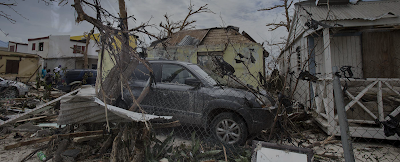With all that is going on in the world with the recent hurricanes, the cold war, politics and an endless supply of bad news, it is no wonder people are feeling stressed, anxious and even helpless at times. The image on the left was in the Washington Post regarding Hurricane Irma. As you can see, the devastation is vast and just getting worse. How do you recover from such loss, trauma and on-going recovery? Resiliency training is the answer. A recent blog by Dr. Eva Gortner gave lots of good tips that I want to use as guidelines for ideas to consider for your own mental and/or emotional well-being.
- Acknowledging your feelings helps you recover.
- Focusing on your strengths and abilities helps you heal.
- Accepting help from community programs and resources is healthy.
- Remember that everyone has different needs and different ways of coping.
- Talk with someone about your feelings – anger, sorrow, and other emotions – even though it may be difficult.
- Do not hold yourself responsible for the disastrous event or be frustrated because you feel you cannot help directly in the rescue work.
- Take steps to promote your own physical and emotional healing by healthy eating, rest, exercise, relaxation, and meditation.
- Maintain a normal family and daily routine, limiting demanding responsibilities on yourself and your family.
- Spend time with family and friends.
- Participate in memorials.
- Use existing support groups of family, friends, and religious institutions.
There are many ways to get or give help during these very difficult moments. Self-care and asking for help may be very difficult for many, but can be such a blessing…….if you just ask. Secondly, give help by showing up at friends, family or neighbors to lend a hand. These times are trying, but also help you discover your inner strength and help you cope.





